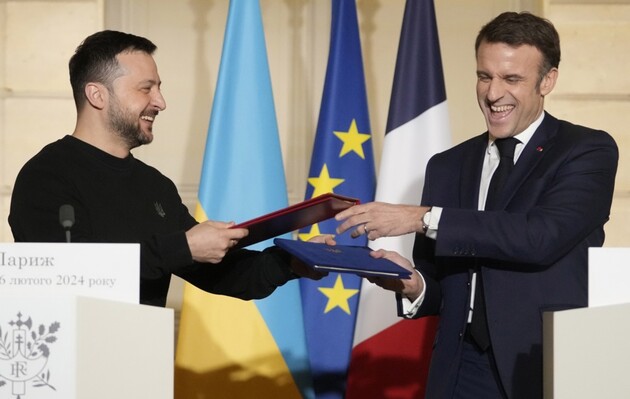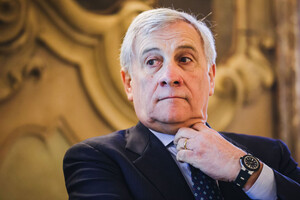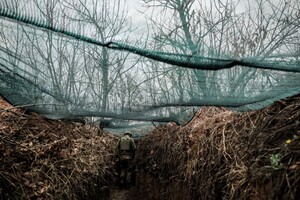Agreements with France and Germany: what do they mean for Ukraine
Sometimes competition between great powers produces unexpected results. As, for example, when Ukraine worked with France and Germany on security cooperation agreements. The rivalry of Paris and Berlin with London for influence on Eastern Europe and Franco-German competition largely determined both the content of the documents and the time of their signing. Acting in unison in the international arena, France and Germany concluded them with Ukraine on the day the Munich Security Conference (MSC) began.
These agreements are not a substitute for Ukraine's membership in the North Atlantic Treaty Organization (NATO) and do not contain security guarantees. Moreover, they will not protect us in the future from new Russian aggression.
Then why does Ukraine need these documents?
These agreements are aimed at strengthening the defense capability of our country. In the absence of prospects in the coming years to become a member of the Alliance or even receive an invitation, Kyiv is seeking to create an international legal network of obligations capable of guaranteeing military, economic and political support for Ukraine from its Western partners for many years and increasing the cost of invasion for the aggressor.
Kyiv plans to sign similar agreements with all countries that have joined the G7 Vilnius Declaration. And there are about thirty of them. Bankova Street also hopes that in a situation where there are serious doubts that our country will be able to count on financial and military support from Washington, security agreements with Great Britain, France, and Germany will push the United States of America to provide assistance to Ukraine.
But it is unlikely that this factor will be taken into account in the Congress of the United States of America, where, against the backdrop of the unfolding presidential campaign, the confrontation between Democrats and Republicans is in full swing. At the same time, Kyiv is negotiating with Washington to sign a security cooperation agreement. ZN.UA sources claim that the document may be ready for signing as early as March, and hope that it can be no less ambitious than the Ukrainian-British agreement.
As ZN.UA previously wrote, by being the first to sign a security cooperation agreement with Kyiv back in mid-January, London set a high bar for other G7 partners. Now in the capital of each of our partners with whom Ukraine plans to conclude a similar agreement, they are forced to look back at the Ukrainian-British document and make the necessary and fundamental adjustments to their projects.
For example, at the initial stage of negotiations, Berlin suggested that Kyiv call the document a joint declaration. As the United Nations (UN) website notes, “the term is often deliberately chosen to demonstrate that the parties do not intend to create legal obligations, but only wish to declare certain aspirations.” For Kyiv, where politicians do not forget the lesson of the “guarantees” of the Budapest Memorandum, this was initially unacceptable, and looking at London and Paris, Berlin gave in.
Commenting on the agreements signed with the Germans and French, Volodymyr Zelenskyy called them very strong and ambitious. German Chancellor Olaf Scholz called it a “historic step,” and French President Emmanuel Macron called it mandatory and concrete. In turn, Deputy Chairman of the Russian Security Council Dmitry Medvedev called the Ukrainian-German agreement “a new alliance of the Nazis with Bandera,” and reacted to the Ukrainian-French agreement with a vulgar picture and the comment that “the novel is unlikely to be appreciated by French farmers and other victims of Macron.”
Analyzing the documents signed by Kyiv with London, Paris and Berlin, we note that although they are not identical, they have common provisions.
The main ones:
Firstly, agreements come into force from the moment of signing. Their validity period is ten years with subsequent extension. At the same time, the agreements provide for the development of bilateral documents in accordance with the areas of cooperation specified in the text. (In a comment to Reuters, Deputy Head of the Office of the President of Ukraine Ihor Zhovkva stated that “there are also annexes to the (Ukrainian-British - V.K.) agreement, which are completely secret. In these annexes we define a specific volume, specific things, specific areas" .)
Secondly, providing comprehensive (including military) support to Ukraine so that our country can defend itself and restore territorial integrity within the borders internationally recognized since 1991.
Thirdly, participation in the restoration of the Ukrainian economy and assistance to our country in the reintegration of the occupied territories.
Fourth, holding consultations within 24 hours in the event of a second Russian invasion and promising to provide our country with rapid, constant and lasting “security assistance, modern military equipment in all necessary areas, as well as economic assistance.” (However, the specific terms of these deliveries are not specified in the agreements.)
Fifthly, support for the Ukrainian economy and fixation of the allocation of funds for military assistance to Ukraine throughout the validity of the agreements, mentioning specific amounts for 2024. Thus, Great Britain undertakes to allocate assistance in the amount of 2.5 billion pounds sterling this year, France – up to 3 billion euros, and Germany – 7.1 (!) billion euros.
Sixth, support for reforms and strengthening Ukraine’s commitment to carry out these transformations.
Seventh, interaction with Ukraine in the field of the defense-industrial complex and attraction of British, French and German investments in this area.
Eighth, cooperation in matters of compensation for damage due to Russian aggression and holding Russia accountable for the crime of aggression against Ukraine.
Ninth, increasing the sanctions pressure on Russia, as well as the fight against circumvention of sanctions.
Tenth, cooperation in the field of intelligence and cybersecurity.
Eleventh, cooperation in countering Russian manipulation, disinformation and propaganda.
Twelfth, assistance in protecting Ukraine's critical infrastructure.
What the three agreements have in common is that the documents do not provide for the sending of British, French or German troops to Ukraine. But there are also noticeable differences between them. They primarily concern the agreement between Ukraine and Germany: the Ukrainian-German document can be called the most cautious. (An analysis of the text of the Ukrainian-British agreement can be found here.)
In contrast to the specific wording of the Ukrainian-British and Ukrainian-French agreements, the Germans carefully avoided the phrase “security obligations.” German politicians prefer to use a more abstract formulation, namely, “Germany intends to provide unwavering support to Ukraine for as long as necessary to help Ukraine defend itself and restore territorial integrity within its internationally recognized borders.”
The Ukrainian-German agreement also does not contain Berlin’s commitment to support Ukraine’s accession to the North Atlantic Treaty Organization (NATO). Instead, the German side decided to use vague language about “improving interoperability with Euro-Atlantic partners” or that “comprehensive reform is necessary for Ukraine’s Euro-Atlantic aspirations.”
Finally, the German side made several important reservations. First, “Germany recalls that national budgetary allocations apply and require the express authorization of the German Bundestag.” Secondly, Berlin emphasized that “all military support will be bound by end-use agreements. Participants share the view that it is necessary to avoid the illegal redirection of military products.”
The strong point of the agreement with Berlin is the commitment to provide Ukraine with 7.1 billion euros this year. In addition, if the UK undertakes to develop the Ukrainian navy, then Germany claims a leading role in the “Integrated Air and Missile Defense” coalition of capabilities.
But the big advantage of the agreement with France, which is not inferior in content to the agreement with the UK, is Paris’s commitment to consistently provide “modern military equipment in the land, air, sea, space and cyber spheres, giving priority, but not limited to, air defense, artillery, long-range weapons, armored vehicles, air power capabilities and other critical capabilities.”
And if Germany (as well as the UK) in the matter of protecting critical infrastructure focuses on training Ukrainian specialists within the framework of international programs and assistance in obtaining modern technological solutions, then France is ready for more action. The Ukraine-France agreement stipulates that government officials in Paris "will contribute to the development of capabilities to protect Ukraine's critical infrastructure, including by military means, giving priority to, but not limited to, modern air defense systems."
Why is the Ukrainian-German agreement inferior to the agreements between Ukraine and Great Britain and France? Did this happen because of the lack of ambition of Berlin's political leaders? Or because the German government has illusions about Putin’s Russia?
Judging by the speeches of Chancellor Scholz and German Defense Minister Pistorius, Berlin has ambitions and no illusions. The position of the Germans is influenced not only by constitutional restrictions or opportunities for the supply of military equipment and weapons: they are traditionally careful in fixing their international legal obligations. And given Germany’s position regarding Ukraine’s membership in the North Atlantic Treaty Organization (NATO), it is not surprising that Berlin wants to avoid speeches about supporting Kyiv’s Euro-Atlantic aspirations.
Nevertheless, all three agreements actually complement each other, fix long-term support for Ukraine in its existential confrontation with the Russian Federation and give our country the opportunity to carry out reforms, build an effective economy, and create modern armed forces. It is important that in the future our partners do not lose the political will to implement these agreements, which oblige them to support Ukraine “as long as necessary,” and that the Ukrainian authorities do not forget about their obligations to reform the country.
Read this article in Ukrainian and russian.
Please select it with the mouse and press Ctrl+Enter or Submit a bug
















 Login with Google
Login with Google